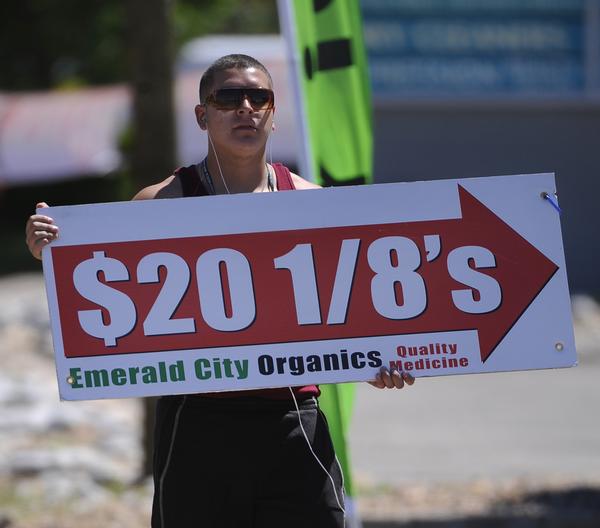
Colorado’s main medical-marijuana lobby is pushing Denver’s City Council to ban outdoor advertising, such as billboards and sign-flippers, for such businesses across the city in an effort to further legitimize the industry.
“We see this as a necessary step to clean up the industry,” said Michael Elliott of the Medical Marijuana Industry Group, a trade association representing more than 50 businesses. “The justification for a complete ban of outdoor advertising (for medical marijuana) is to prevent the encouragement of nonqualifying patients to use” the product.
The council is considering a bill to outlaw outdoor advertising for medical-marijuana centers 1,000 feet from schools, day-care centers, parks and recreation centers. But council members may look at a citywide ban instead.
“I was trying to look at doing something that was reasonable and something that I knew could withstand a court challenge and was focused on the kids,” said Councilwoman Debbie Ortega, who is sponsoring the legislation.
Ortega asked the medical-marijuana groups to come together on a citywide ordinance.
“Are you willing to support this and move forward?” she asked the groups gathered at a council committee meeting Wednesday. “If you all could get on the same page, I would be more than willing to work with you on a citywide ban.”
Ortega has crafted the ordinance from the federal tobacco-advertising laws. The ordinance’s purpose, she said, would be to reduce use and possession by minors.
Norton Arbelaez, a board member of the Medical Marijuana Industry Group, said medical-marijuana advertising is not protected free speech under the First Amendment because the product is illegal under federal law.
“In order to qualify for the protection of free speech, you have to say something legal,” he said. “This is a substance that is against federal law. Because its status is illegal; it doesn’t qualify for First Amendment protections under federal law.”
Denver Assistant City Attorney David Broadwell said he was surprised that Arbelaez is basing his argument on the fact that marijuana is illegal under federal law.
Arbelaez reviewed laws in other states and cities. Vermont and Montana, for example, prohibit any medical-marijuana advertising. In San Francisco, advertising requires a disclaimer, saying medical marijuana can be used only for medical purposes. Boulder prohibits advertising that promotes medical marijuana for recreational use.
Arbelaez said 89,646 patients, about 1.75 percent of Colorado’s population, are on the registry to obtain medical marijuana. Nearly 14,000 of those patients live in Denver. He said since cannabis is legal for such a small percentage of people, it doesn’t make sense to advertise to the general population.
He showed a photo of a sign-spinner spotted Wednesday morning at West 44th Avenue and Lowell Boulevard, saying that kind of advertising hurts the legitimacy of the business.
Shawn Coleman, director of the Cannabis Business Alliance, said he is in favor of banning the advertising around schools but not citywide. He said such a ban would be a slippery slope that could endanger the entire industry.
“People might say if you can’t advertise your business, you shouldn’t have them at all,” he said.
One dispensary owner said outdoor advertising is necessary because competition is so tough these days.
“Every day, it is difficult to get people in my doors when there are as many dispensaries as Starbucks in this city,” said Toni Fox, owner of 3-D Denver’s Discreet Dispensary at Interstate 70 and Brighton Boulevard.
Last summer, she employed a sign-spinner for about a month but decided it wasn’t worth the cost. She now places signs near the street.
“Are they going to ban sign spinning for all the other businesses that do it?” she asked. “I come into work every day, and I see sign-spinners for computer repair, cellphone shops.”
Jeremy P. Meyer: 303-954-1367 or jpmeyer@denverpost.com